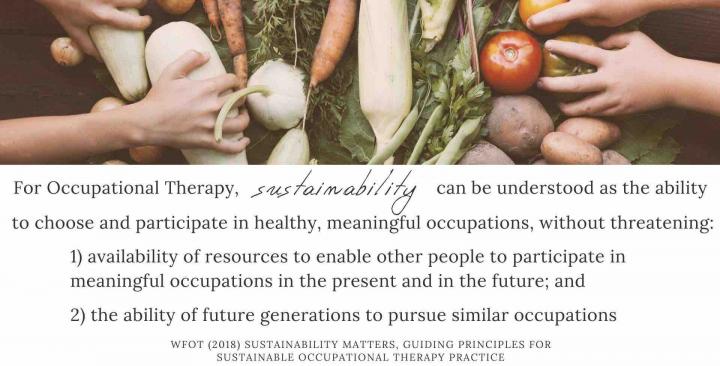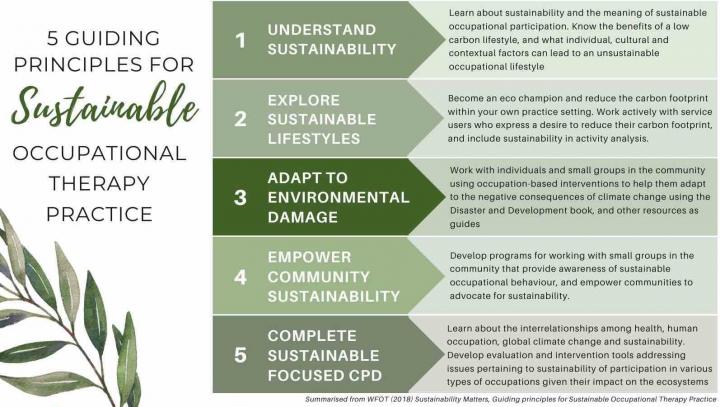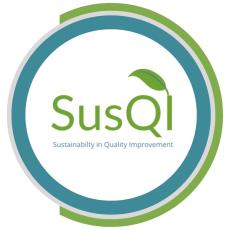Sustainable Occupational Therapy

Consideration of the environment is integral to occupational therapy models and interventions, yet if we are not addressing the issue of climate change and the probable impacts on service users and ourselves, are we being truly holistic?
The World Federation of Occupational Therapists, College of Occupational Therapists and Swedish Association of Occupational Therapists have all produced papers exploring sustainable OT practice. The COT code of ethics encourages OTs to 'expand our clinical reasoning about occupational performance to include sustainable development', and service users can benefit from this incorporation of a sustainable healthful approach to practice.
Want some Sustainable Occupational Therapy Resources? Check out our resource map here.
What Is Sustainable Occupational Therapy?

Common occupations already explored by OTs with service users such as gardening, cooking, craft and exercise could all be viewed through a ‘sustainable lens’ and are known to promote psycho-emotional well being, often resulting in ‘peak’ or ‘flow’ experiences. The co-benefits to service users are likely to include better health awareness, cost savings and improved quality of life. A brief overview of sustainable occupational therapy practice is given in this consensus statement from a networking day at the COT.
There are also other ways that Occupational Therapists can utilise a ‘sustainable lens’. Smith (2015, p31) suggests that OT’s can:
- Raise awareness locally about sustainability with TLC (turn off, lights out, close doors and windows
- Use proactive prompting to decrease do not attends, and time waste by using technology e.g. text and email
- Monitor history of prescribed equipment to avoid duplication and reduce waste
- Allocate referrals to staff so they are clustered by geography to decrease waste from travel
- Introduce single MDT visits as a more efficient alternative to repeat home visits and equipment delivery
- Encouraging staff to accept suitable recycled equipment
- Ensure durability of equipment purchased and efficient collections to enable longer term recycling
- Address waste in time, travel, and cost
- Use social media as a tool to promote sustainable OT actions
- Promote the OT role in reducing challenging behaviour and PRN medication
Smith, G. (2015). Saving resources, Improving health. Occupational Therapy News, 23(1), 30-31.
How To Be A Sustainable Occupational Therapy Practitioner

The WFOT (2018) Sustainability Matters, Guiding principles for Sustainable Occupational Therapy Practice publication has outlined 5 principles for Sustainable Occupational Therapy practice:
- Principle 1: Understanding Sustainability - An Occupational Therapy Perspective. Occupational therapy practitioners shall be encouraged to educate themselves about issues of ecosystem sustainability as it impacts ability to pursue chosen meaningful occupations and subsequently human health and well-being.
- Principle 2: The role of Occupational Therapy in contributing towards mitigation of environmental damage due to unsustainable lifestyles. Occupational therapy practitioners shall work with interested service users and communities to help them explore ways of participating in healthy, meaningful occupations in such a way that they contribute towards mitigation of environmental damage due to unsustainable lifestyles.
- Principle 3: Helping Occupational Therapy service users adapt to the consequences of environmental damage due to unsustainability. Occupational therapy practitioners shall be encouraged to work collaboratively with service users to help them adapt to deleterious and health-impacting effects of environmental degradation due to unsustainable lifestyles so that they can continue to participate in meaningful occupations in a sustainable manner.
- Principle 4: Community sustainability in the face of environmental catastrophes. Occupational therapy practitioners shall be encouraged to develop competences for empowering communities to find ways of facilitating meaningful occupations in a sustainable manner among community members, taking into account the need to maintain equitability and occupational justice.
- Principle 5: Developing professional competence for administering occupation-based interventions to address sustainability issues. Occupational therapy practitioners shall be encouraged to develop and maintain competence in administering occupation-based interventions to help interested service users and communities address ecosystem sustainability issues.
Sustainable Healthcare Courses
Foundation Courses
For Occupational Therapists looking to learn more about sustainable healthcare, we recommend starting with one of our 3-part multidisciplinary or specialty-specific foundation courses which includes:
- 4–6-hour interactive online package
- 4-hour small group online workshop facilitated by national experts
- two-hour sustainable healthcare cafés to build networks and receive/offer advice from experts and peers on sustainability projects
 Introduction to Sustainable Healthcare
Introduction to Sustainable Healthcare
This multidisciplinary foundation course offers an overview of the relationship between health, the health sector and the climate and ecological crises. How is the health system both vulnerable to and contributing to climate change and ecological degradation? What would a sustainable health system look like? What might the wider benefits be and how can we achieve this? Learn more
Sustainable Mental Healthcare
 This mulitdisciplinary foundation course is specifically tailored to health and social care staff working in mental health. It offers an overview of the relationship between health, the health sector and the climate and ecological crises; explains how the health system is both vulnerable to and contributing to climate change and ecological degradation; explores what a sustainable mental health system looks like, what the wider benefits could be and how we might achieve this. Learn more
This mulitdisciplinary foundation course is specifically tailored to health and social care staff working in mental health. It offers an overview of the relationship between health, the health sector and the climate and ecological crises; explains how the health system is both vulnerable to and contributing to climate change and ecological degradation; explores what a sustainable mental health system looks like, what the wider benefits could be and how we might achieve this. Learn more
 Green Space and Health
Green Space and Health
‘Green' prescriptions are increasingly being used by healthcare professionals to deliver health benefits for patients. This course explores the evidence base and its implications for healthcare and the design of clinical settings. It showcases examples of green prevention and therapy and illustrates how you can integrate these into your own practice. Learn more
Technical Courses
These in-depth courses build skills for planning and measuring projects. They include:
- 4–6-hour interactive online package
- 4-hour small group online workshop facilitated by national experts
- work in progress follow up session
 Carbon Footprinting for Healthcare
Carbon Footprinting for Healthcare
This course helps health professionals, quality improvement leads and medical students to become carbon literate. You will gain an understanding of what a carbon footprint is, how it can be used in the NHS’s endeavor to go net zero and how it is measured. You will also learn about different carbon footprinting studies in healthcare and what can be learned from them. Learn more
 Sustainable Quality Improvement
Sustainable Quality Improvement
This intensive course introduces health professionals and educators to the concept of ‘sustainable value’ and the ‘SusQI’ framework for integrating sustainability into quality improvement. Learn more
Sustainable Occupational Therapy Network
OT Susnet started life in 2009 when Tamara Rayment, an occupational therapist who had seen what we were doing to create a community of people and practice in Green Nephrology, approached us with the determination to do the same in OT. Tamara worked with us entirely on a voluntary basis and helped the Green Occupational Therapy network to grow to over 250 people. Ben Whittaker joined her later that year and together they wrote papers, presented at conferences and created an energetic network.
Ben is now the lead on this specialty and works for CSH one day a week alongside his job as a mental health occupational therapist. The Occupational Therapy Sustainable Practice Network (OT Susnet) now numbers over 600 and is inspiring international accolades as well as local action. Ben is exploring the clinical reasoning underpinning sustainable OT practice*, as well as linking in with the College of Occupational Therapists, the World Federation of Occupational Therapists and research collaborators.
Sustainable Occupational Therapy Resources
To read articles relating to sustainable occupational therapy and other areas of sustainable clinical practice please visit our publications page. More discipline-specific resources are listed below:
Occupational Therapy Sustainability National and International Association papers
- World Federation of Occupational Therapists - Sustainability Matters: Guiding Principles for Sustainability in Occupational Therapy Practice, Education and Scholarship
- World Federation of Occupational Therapists – Ethics, Sustainability and Global Matters
- World Federation of Occupational Therapists - Environmental Sustainability, Sustainable Practice within Occupational Therapy
- Swedish Association of Occupational Therapists – Sustainable Development
Sustainable Occupational Therapy Journal Articles:
- Occupational Therapy and Environmental Sustainability
- A call for sustainable practice in occupational therapy
- Sustainable occupational responses to climate change through lifestyle choices
- How to contribute occupationally to ecological sustainability: A literature review
- Sustainable Global Wellbeing: A Proposed Expansion of the Occupational Therapy Paradigm
Key OT Susnet Posts
- 10:10 Occupational Therapy Checklist
- Sustainability Series: Occupational Therapy: Improving Lives, Saving Money, Reducing Carbon
- 5 ways to integrate sustainability into your 2018 Occupational Therapy practice
- Identifying the sustainable value of virtual care in occupational therapy
- A greener future
- Green Walking in mental health recovery
- Prescribing movement
* Whittaker B (2012) Sustainable Global Wellbeing: a proposed expansion of the occupational therapy paradigm. British Journal of Occupational Therapy, 75(9) 436-439

